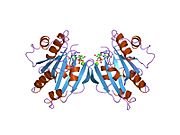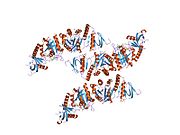From Wikipedia, the free encyclopedia
Protein-coding gene in the species Homo sapiens
ADP-ribosylation factor 3 is a protein that in humans is encoded by the ARF3 gene .[ 5] [ 6]
ADP-ribosylation factor 3 (ARF3) is a member of the human ARF gene family. These genes encode small guanine nucleotide-binding proteins that stimulate the ADP-ribosyltransferase activity of cholera toxin and play a role in vesicular trafficking and as activators of phospholipase D. The gene products include 6 ARF proteins and 11 ARF-like proteins and constitute 1 family of the RAS superfamily. The ARF proteins are categorized as class I (ARF1, ARF2, and ARF3), class II (ARF4 and ARF5) and class III (ARF6) and members of each class share a common gene organization. The ARF3 gene contains five exons and four introns.[ 6]
ARF3 has been shown to interact with:
^ a b c GRCh38: Ensembl release 89: ENSG00000134287 – Ensembl , May 2017^ a b c GRCm38: Ensembl release 89: ENSMUSG00000051853 – Ensembl , May 2017^ "Human PubMed Reference:" . National Center for Biotechnology Information, U.S. National Library of Medicine .^ "Mouse PubMed Reference:" . National Center for Biotechnology Information, U.S. National Library of Medicine .^ Hirai M, Kusuda J, Hashimoto K (June 1996). "Assignment of human ADP ribosylation factor (ARF) genes ARF1 and ARF3 to chromosomes 1q42 and 12q13, respectively". Genomics . 34 (2): 263– 5. doi :10.1006/geno.1996.0283 . PMID 8661066 . ^ a b "Entrez Gene: ARF3 ADP-ribosylation factor 3" .^ a b Kanoh H, Williger BT, Exton JH (February 1997). "Arfaptin 1, a putative cytosolic target protein of ADP-ribosylation factor, is recruited to Golgi membranes" . J. Biol. Chem . 272 (9): 5421– 9. doi :10.1074/jbc.272.9.5421 PMID 9038142 . ^ Williger BT, Provost JJ, Ho WT, Milstine J, Exton JH (July 1999). "Arfaptin 1 forms a complex with ADP-ribosylation factor and inhibits phospholipase D". FEBS Lett . 454 (1– 2): 85– 9. doi :10.1016/s0014-5793(99)00771-1 . PMID 10413101 . S2CID 40655171 . ^ a b Boman AL, Salo PD, Hauglund MJ, Strand NL, Rensink SJ, Zhdankina O (September 2002). "ADP-ribosylation factor (ARF) interaction is not sufficient for yeast GGA protein function or localization" . Mol. Biol. Cell . 13 (9): 3078– 95. doi :10.1091/mbc.E02-02-0078 . PMC 124144 PMID 12221117 . ^ a b Boman AL, Zhang Cj, Zhu X, Kahn RA (April 2000). "A family of ADP-ribosylation factor effectors that can alter membrane transport through the trans-Golgi" . Mol. Biol. Cell . 11 (4): 1241– 55. doi :10.1091/mbc.11.4.1241 . PMC 14844 PMID 10749927 . ^ Boman AL, Kuai J, Zhu X, Chen J, Kuriyama R, Kahn RA (October 1999). "Arf proteins bind to mitotic kinesin-like protein 1 (MKLP1) in a GTP-dependent fashion". Cell Motil. Cytoskeleton . 44 (2): 119– 32. doi :10.1002/(SICI)1097-0169(199910)44:2<119::AID-CM4>3.0.CO;2-C . PMID 10506747 .
Lee FJ, Moss J, Vaughan M (1992). "Human and Giardia ADP-ribosylation factors (ARFs) complement ARF function in Saccharomyces cerevisiae" . J. Biol. Chem . 267 (34): 24441– 5. doi :10.1016/S0021-9258(18)35786-7 PMID 1447192 . Lee CM, Haun RS, Tsai SC, Moss J, Vaughan M (1992). "Characterization of the human gene encoding ADP-ribosylation factor 1, a guanine nucleotide-binding activator of cholera toxin" . J. Biol. Chem . 267 (13): 9028– 34. doi :10.1016/S0021-9258(19)50383-0 PMID 1577740 . Tsai SC, Haun RS, Tsuchiya M, Moss J, Vaughan M (1991). "Isolation and characterization of the human gene for ADP-ribosylation factor 3, a 20-kDa guanine nucleotide-binding protein activator of cholera toxin" . J. Biol. Chem . 266 (34): 23053– 9. doi :10.1016/S0021-9258(18)54462-8 PMID 1744102 . Stearns T, Willingham MC, Botstein D, Kahn RA (1990). "ADP-ribosylation factor is functionally and physically associated with the Golgi complex" . Proc. Natl. Acad. Sci. U.S.A . 87 (3): 1238– 42. Bibcode :1990PNAS...87.1238S . doi :10.1073/pnas.87.3.1238 PMC 53446 PMID 2105501 . Bobak DA, Nightingale MS, Murtagh JJ, Price SR, Moss J, Vaughan M (1989). "Molecular cloning, characterization, and expression of human ADP-ribosylation factors: two guanine nucleotide-dependent activators of cholera toxin" . Proc. Natl. Acad. Sci. U.S.A . 86 (16): 6101– 5. Bibcode :1989PNAS...86.6101B . doi :10.1073/pnas.86.16.6101 PMC 297783 PMID 2474826 . Orcl L, Palmer DJ, Amherdt M, Rothman JE (1993). "Coated vesicle assembly in the Golgi requires only coatomer and ARF proteins from the cytosol". Nature . 364 (6439): 732– 4. Bibcode :1993Natur.364..732O . doi :10.1038/364732a0 . PMID 8355790 . S2CID 4348442 . Haun RS, Moss J, Vaughan M (1993). "Characterization of the human ADP-ribosylation factor 3 promoter. Transcriptional regulation of a TATA-less promoter" . J. Biol. Chem . 268 (12): 8793– 800. doi :10.1016/S0021-9258(18)52944-6 PMID 8473323 . Helms JB, Palmer DJ, Rothman JE (1993). "Two distinct populations of ARF bound to Golgi membranes" . J. Cell Biol . 121 (4): 751– 60. doi :10.1083/jcb.121.4.751 . PMC 2119793 PMID 8491770 . Hosaka M, Toda K, Takatsu H, Torii S, Murakami K, Nakayama K (1996). "Structure and intracellular localization of mouse ADP-ribosylation factors type 1 to type 6 (ARF1-ARF6)". J. Biochem . 120 (4): 813– 9. doi :10.1093/oxfordjournals.jbchem.a021484 . PMID 8947846 . Kanoh H, Williger BT, Exton JH (1997). "Arfaptin 1, a putative cytosolic target protein of ADP-ribosylation factor, is recruited to Golgi membranes" . J. Biol. Chem . 272 (9): 5421– 9. doi :10.1074/jbc.272.9.5421 PMID 9038142 . Williger BT, Provost JJ, Ho WT, Milstine J, Exton JH (1999). "Arfaptin 1 forms a complex with ADP-ribosylation factor and inhibits phospholipase D". FEBS Lett . 454 (1– 2): 85– 9. doi :10.1016/S0014-5793(99)00771-1 . PMID 10413101 . S2CID 40655171 . Boman AL, Kuai J, Zhu X, Chen J, Kuriyama R, Kahn RA (1999). "Arf proteins bind to mitotic kinesin-like protein 1 (MKLP1) in a GTP-dependent fashion". Cell Motil. Cytoskeleton . 44 (2): 119– 32. doi :10.1002/(SICI)1097-0169(199910)44:2<119::AID-CM4>3.0.CO;2-C . PMID 10506747 . Takeya R, Takeshige K, Sumimoto H (2000). "Interaction of the PDZ domain of human PICK1 with class I ADP-ribosylation factors". Biochem. Biophys. Res. Commun . 267 (1): 149– 55. doi :10.1006/bbrc.1999.1932 . PMID 10623590 . Boman AL, Zhang Cj, Zhu X, Kahn RA (2000). "A family of ADP-ribosylation factor effectors that can alter membrane transport through the trans-Golgi" . Mol. Biol. Cell . 11 (4): 1241– 55. doi :10.1091/mbc.11.4.1241 . PMC 14844 PMID 10749927 . Nevrivy DJ, Peterson VJ, Avram D, Ishmael JE, Hansen SG, Dowell P, Hruby DE, Dawson MI, Leid M (2000). "Interaction of GRASP, a protein encoded by a novel retinoic acid-induced gene, with members of the cytohesin family of guanine nucleotide exchange factors" . J. Biol. Chem . 275 (22): 16827– 36. doi :10.1074/jbc.275.22.16827 PMID 10828067 . Zhdankina O, Strand NL, Redmond JM, Boman AL (2001). "Yeast GGA proteins interact with GTP-bound Arf and facilitate transport through the Golgi" . Yeast . 18 (1): 1– 18. doi :10.1002/1097-0061(200101)18:1<1::AID-YEA644>3.0.CO;2-5 PMID 11124697 . S2CID 10348751 . Irobi J, Nelis E, Verhoeven K, De Vriendt E, Dierick I, De Jonghe P, Van Broeckhoven C, Timmerman V (2002). "Mutation analysis of 12 candidate genes for distal hereditary motor neuropathy type II (distal HMN II) linked to 12q24.3". J. Peripher. Nerv. Syst . 7 (2): 87– 95. doi :10.1046/j.1529-8027.2002.02014.x . PMID 12090300 . S2CID 8453412 . Li F, Mandal M, Mishra SK, Barnes CJ, Kumar R (2002). "Heregulin promotes expression and subcellular redistribution of ADP-ribosylation factor 3". FEBS Lett . 524 (1– 3): 49– 53. doi :10.1016/S0014-5793(02)02994-0 . PMID 12135740 . S2CID 36764648 . Boman AL, Salo PD, Hauglund MJ, Strand NL, Rensink SJ, Zhdankina O (2002). "ADP-ribosylation factor (ARF) interaction is not sufficient for yeast GGA protein function or localization" . Mol. Biol. Cell . 13 (9): 3078– 95. doi :10.1091/mbc.E02-02-0078 . PMC 124144 PMID 12221117 .
PDB gallery
1hur : HUMAN ADP-RIBOSYLATION FACTOR 1 COMPLEXED WITH GDP, FULL LENGTH NON-MYRISTOYLATED
1j2j : Crystal structure of GGA1 GAT N-terminal region in complex with ARF1 GTP form
1o3y : Crystal structure of mouse ARF1 (delta17-Q71L), GTP form
1r8q : FULL-LENGTH ARF1-GDP-MG IN COMPLEX WITH BREFELDIN A AND A SEC7 DOMAIN
1r8s : ARF1[DELTA1-17]-GDP IN COMPLEX WITH A SEC7 DOMAIN CARRYING THE MUTATION OF THE CATALYTIC GLUTAMATE TO LYSINE
1re0 : Structure of ARF1-GDP bound to Sec7 domain complexed with Brefeldin A
1rrf : NON-MYRISTOYLATED RAT ADP-RIBOSYLATION FACTOR-1 COMPLEXED WITH GDP, MONOMERIC CRYSTAL FORM
1rrg : NON-MYRISTOYLATED RAT ADP-RIBOSYLATION FACTOR-1 COMPLEXED WITH GDP, DIMERIC CRYSTAL FORM
1s9d : ARF1[DELTA 1-17]-GDP-MG IN COMPLEX WITH BREFELDIN A AND A SEC7 DOMAIN
1u81 : Delta-17 Human ADP Ribosylation Factor 1 Complexed with GDP
2j59 : CRYSTAL STRUCTURE OF THE ARF1:ARHGAP21-ARFBD COMPLEX













![1r8s: ARF1[DELTA1-17]-GDP IN COMPLEX WITH A SEC7 DOMAIN CARRYING THE MUTATION OF THE CATALYTIC GLUTAMATE TO LYSINE](http://upload.wikimedia.org/wikipedia/commons/thumb/6/68/PDB_1r8s_EBI.jpg/180px-PDB_1r8s_EBI.jpg)



![1s9d: ARF1[DELTA 1-17]-GDP-MG IN COMPLEX WITH BREFELDIN A AND A SEC7 DOMAIN](http://upload.wikimedia.org/wikipedia/commons/thumb/8/84/PDB_1s9d_EBI.jpg/180px-PDB_1s9d_EBI.jpg)

